 Reuters
ReutersA "chopsticks" rocket catch by Elon Musk's SpaceX was among the highlights of 2024
A total solar eclipse seen by millions, a lost jungle city discovered by accident and hope for the almost extinct northern white rhino - science has given us a lot to get excited about this year.
One of the biggest news stories was about making space travel cheaper and easier, with Elon Musk's Starship making a giant step towards humanity having a reusable rocket.
Of course it's not all been positive. In bad news for the planet, for example, it is now virtually certain that 2024 will be the world's warmest year on record.
But there has been a lot to celebrate. Here are seven of our favourite uplifting science stories of the year.
That 'chopsticks' rocket catch
Watch: Why is the latest SpaceX rocket test a big deal?
In October, Elon Musk's Starship rocket completed a world first after part of it was captured on its return to the launch pad.
The SpaceX vehicle's lower booster rocket flew back to its launch tower, instead of falling into the sea. It was caught in a giant pair of mechanical arms, or "chopsticks" as part of its fifth test flight.
It brought SpaceX's ambition of developing a fully reusable and rapidly deployable rocket to go to the Moon and maybe even Mars a big step closer.
"A day for the history books," engineers at SpaceX declared as the booster landed safely.
You can read more about the 'chopsticks' moment here.
More 'out of this world' stories from 2024Mapping the fly brain
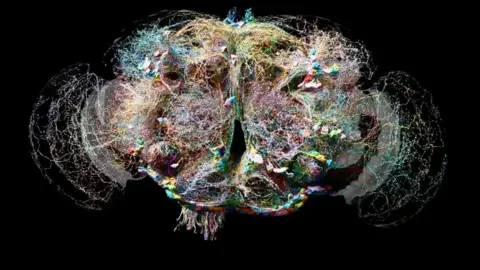 MRC/Nature
MRC/NatureAs beautiful as it is complex, the fly's brain has more than 130,000 wires with 50 million intricate connections
They can walk, hover and the males can even sing love songs to woo mates - all this with a brain that's tinier than a pinhead.
But it wasn't until October that scientists studying the brain of a fruit fly mapped the position, shape and connections of every single one of its 130,000 cells and 50 million connections.
It was the most detailed analysis of the brain of an adult animal ever produced, and one leading brain specialist described the breakthrough as a "huge leap" in our understanding of our own brains.
One of the research leaders said it would shed new light into "the mechanism of thought". Read more about the story here.
Lost Mayan city found 'by accident'
What might the city have looked like?
Imagine you've Googled something, you get to page 16 of the results and: "Hold on, is that a lost Mayan city?"
Well that's what happened to Luke Auld-Thomas, a PhD student at Tulane University in the US, who came across a laser survey done by a Mexican organisation for environmental monitoring.
When he processed the data with methods used by archaeologists, he saw what others had missed - a huge ancient city which may have been home to 30-50,000 people at its peak from 750 to 850 AD.
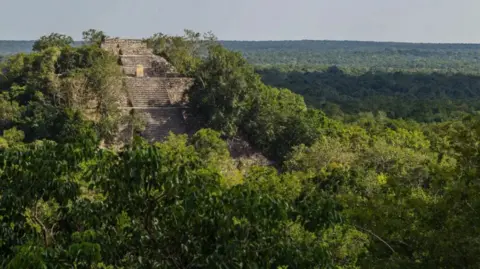 Getty Images
Getty ImagesThere are no pictures of the city but it had pyramid temples similar to this one in nearby Calakmul
In the city, which had disappeared under jungle canopy in Mexico, archaeologists found pyramids, sports fields and amphitheatres.
The complex - which researchers named Valeriana - was revealed using Lidar, a type of laser survey that maps structures buried under vegetation.
World's first IVF rhino pregnancy
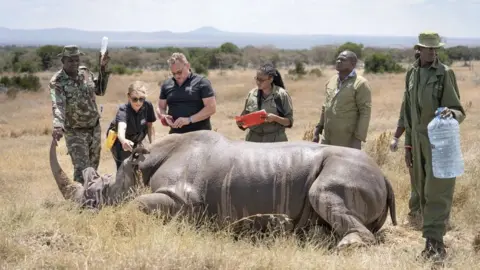 Jan Zwilling
Jan ZwillingThe embryo transfer was carried out using a surrogate southern white rhino mother
There are only two northern white rhinos left in the world, but we reported on a fertility breakthrough that offered hope for saving the species.
Scientists achieved the world's first IVF rhino pregnancy, successfully transferring a lab-created rhino embryo into a surrogate mother.
The procedure was carried out with southern white rhinos, a closely related sub-species of northern whites which still number in the thousands, and took 13 attempts to accomplish.
The mother eventually died of an infection, but a post-mortem revealed that the 6.5cm male foetus was developing well and had a 95% chance of being born alive, showing that a viable pregnancy through rhino IVF is possible.
There are 30 precious northern white rhino embryos in existence, and the next step is to try IVF using these.
Conservation slowed nature loss
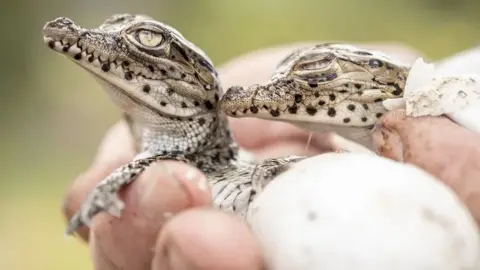 Robin Moore/Re:wild
Robin Moore/Re:wildCuban crocodiles at a breeding sanctuary - one of a number of conservation actions studied
With human activity driving what conservation charity the World Wide Fund for Nature (WWF) calls a "catastrophic" loss of species, it can sometimes feel like we don't hear an awful lot of good news about nature.
But a ten-year study showed conservation actions are effective at reducing global biodiversity loss.
Scientists from dozens of research institutes reviewed 665 trials of conservation measures in different countries and oceans, and found they had had a positive effect in two out of every three cases.
The measures ranged from hatching Chinook salmon to the eradication of invasive algae, and the study's authors said their findings offered a "ray of light" for those working to protect threatened animals and plants.
Read more about the story here.
The solar eclipse that stunned millions
Watch: Stunning images of the total solar eclipse crossing North America
Tens of millions of people across Mexico, the US and Canada had their heads turned, literally by a total solar eclipse.
This is where the Moon moves between the Earth and the Sun, extinguishing its light.
A total solar eclipse occurs somewhere on Earth roughly every 18 months, but they are often in quite unpopulated areas, whereas this one had major cities including Dallas in its path.
The path of totality - the area where people could see the Moon totally block the Sun - was also much wider this year than it was during the spectacular total solar eclipse of 2017.
For more on the story read here.
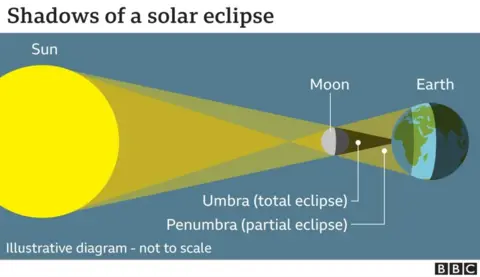
New life from beloved Sycamore Gap tree
Watch: seedlings from Sycamore Gap tree sprout up
Millions once visited Sycamore Gap, the famous sycamore tree nestled in a gap in Hadrian's Wall.
So when it was cut down in 2023, naturally a national outpouring of shock and dismay followed.
But in March, new life sprung from the tree's rescued seeds and twigs, giving hope that the iconic tree has a future.
BBC News saw the new shoots on a rare visit to the secret National Trust centre protecting the seedlings.
Young twigs and seeds thrown to the ground when the tree toppled were salvaged by the National Trust, which cares for the site with the Northumberland National Park Authority.
The saplings are now being given to charities, groups and individuals as "trees of hope".











